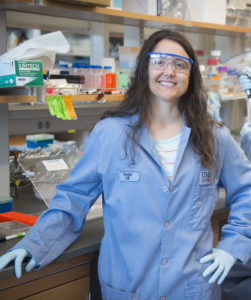
Speaker: Shelly R. Peyton, Ph.D.
Professor, Armstrong Professional Development Professor
Chemical Engineering, Biomedical Engineering Adjunct
College of Engineering
University of Massachusetts Amherst
Date: Thursday, December 9, 2021
Time: 3:30-4:30 PM EST
Zoom – check email for link
This seminar will be held virtually, but students registered for BE 699 can gather to watch in Moore 216.
Abstract: Improved experimental model systems are critically needed to better understand cancer progression and bridge the gap between lab bench proof-of-concept studies, validation in animal models, and eventual clinical application. Many methods exist to create biomaterials, including hydrogels, which we use to study cells in contexts more akin to what they experience in the human body. Our lab has multiple approaches to create such biomaterials, based on combinations of poly(ethylene glycol) (PEG) with peptides and zwitterions. In this presentation, I will discuss our synthetic approaches to building life-like materials, how we use these systems to grow cells and understand how a cell’s environment, particularly the extracellular matrix regulates cancer cell growth, dormancy, and drug sensitivity.
Shelly Peyton Bio: Shelly Peyton is the Armstrong Professor and Graduate Program Director, and chair of the Diversity, Equity, and Inclusion (DEI) committee of Chemical Engineering at the University of Massachusetts Amherst. She is co-director of the Models 2 Medicine Center in the Institute for Applied Life Sciences. She received her B.S. in Chemical Engineering from Northwestern University in 2002 and went on to obtain her MS and PhD in Chemical Engineering from the University of California, Irvine. She was then an NIH Kirschstein post-doctoral fellow in the Biological Engineering department at MIT before starting her academic appointment at UMass in 2011. Shelly leads an interdisciplinary group of engineers and molecular cell biologists seeking to create and apply novel biomaterials platforms toward new solutions to grand challenges in human health. Her lab’s unique approach is using our engineering expertise to build simplified models of human tissue with synthetic biomaterials. They use these systems to understand 1) the physical relationship between metastatic breast cancer cells and the tissues to which they spread, 2) the role of matrix remodeling in drug resistance, and 3) how to create bioinspired mechanically dynamic and activatable biomaterials. Among other honors for her work, Shelly was a 2013 Pew Biomedical Scholar, received a New Innovator Award from the NIH, and she was awarded a CAREER grant from the NSF. Shelly is co-PI with Jeanne Hardy on the Biotechnology (BTP) NIH T32 program and is a co-PI of the PREP program at UMass, which brings students from URM groups to UMass for a 1-year post-BS study to help prepare them for graduate school.
